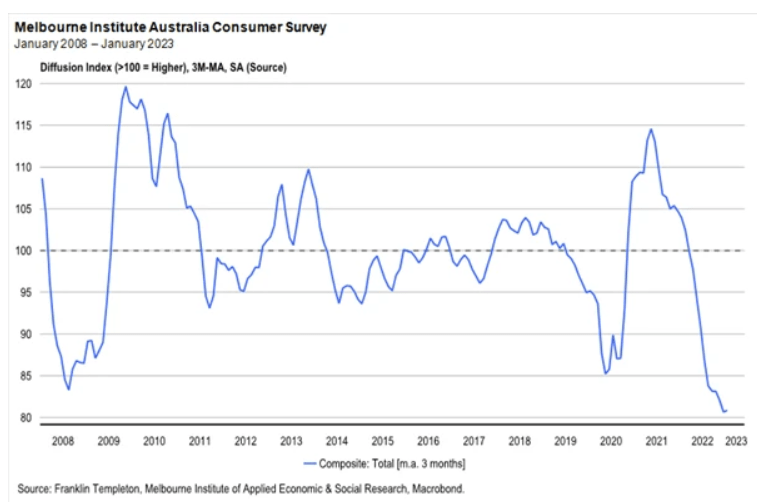Economics
Call me Siniakov, but I think the RBA is trying to eat the Aussie consumer
If there is one thing the RBA wants, it is for Australians to stop spending. And maybe lose a few … Read More
The post Call me Siniakov, but I think…

If there is one thing the RBA wants, it is for Australians to stop spending.
And maybe lose a few jobs.
“It is still early days, but signs are growing that the Australian consumer might finally be getting the memo. If that’s the case, its good news towards the task of cooling domestic demand and further adds to confidence that inflationary pressures peaked at the end of 2022 and will ease this year – a point made recently by the (the RBA’s Head of Economic Analysis), Marion Kohler,” says Chris Siniakov, Managing Director at Franklin Templeton Australia Fixed Income.
For the last 6 months, understanding the intersection of rate hikes, very poor consumer sentiment but still solid consumption has been challenging, he adds.
The RBA on Tuesday released the minutes of its February meeting where it raised the official cash rate up 25 basis points to 3.35%
Turns out the RBA was rather close to going with a mega 50 bps but in the end it opted for calm, which is good considering the previous 9 straight hikes.
“The arguments … noted that inflation was expected to have reached its peak, that the outlook was for a softening in consumption growth and that there were many uncertainties around the outlook” the minutes recorded.
“Everyone knows rate hikes will work but, aside from the initial move lower in housing activity and house prices, it has been a game of waiting to see when tighter policy would actually start to bite everyday activity. Signs continue to appear that this is finally starting to happen.”
The chart below shows the Westpac-Melbourne Institute Consumer Sentiment Index which has been at or below GFC levels for several months.
Chris says this is a very, very unhappy Consumer Sentiment Index.
“It’s not just weak, its deeply pessimistic and has never been so depressed outside of a recession”.
– Chris Siniakov, MD Franklin Templeton Australia Fixed Income
I for one, know exactly how it feels:

Worse than it looks (which is better than it sounds)
Chris says that despite this acute pessimism, Australian retail sales have been strong over 2022 as the liberated little Aussie consumer has come leaping out of lockdown and spent up what’s been pent up.
“The chart (see below) shows the value of retail sales over the last twenty years with the trend. The blue line highlights how far spending surged in the pandemic lockdown. Most recently retail sales are showing welcome signs of cooling, potentially quickly.
“The December monthly print of -3.9% is the largest monthly fall since August 2020 when Victoria went into lockdown. It’s recognised that November saw somewhat of a pull forward in spending with the Black Friday sales promotional period but looking at the quarterly trend for retail sales, these rose by 0.9% for the entire fourth quarter, well down from 2.5% in the prior quarter.”
Core inflation was 1.7% over this period, suggesting that retail spending fell in inflation adjusted or volume terms.
“In other words, take out price effects, and retail sales probably declined in the fourth quarter,” he says.

Chris says the devil is in the CPI detail, which shows that whilst goods inflation has been easing, the trigger happy Aussie consumer has been spending big on services. Something that Myer and DJ’s loves, but the RBA is unlikely to let slide.
In fact, he says most of the upside surprise for the December quarter CPI is explained by Australians “who went nuts on overpriced holidays.”
“Recreation and culture boomed by 5.4% in the quarter, adding ~1/3 of the entire 1.9% CPI figure, making it the single largest contributor by a long shot.
“As of this writing, the terminal cash rate is projected to rise toward 3.75% though the timing is highly uncertain. We have and continue to argue that the current 3.1% level is already restrictive. Pausing now would still result in tighter policy as rate hikes continue to flow through and as a significant volume of fixed rate mortgages (more than 500k) mature in coming months seeing a sharp jump in borrowing costs for a significant proportion of borrowers.
Over-tightening to bust ‘revenge-spend’
Our mates at Bloomers Intelligence say the impact of fixed rate mortgage maturities in 2023 alone is equivalent to 2.2% of retail sales. A significant number considering consumption still accounts for ~60% of total GDP.
Chris reckons further tightening will put the squeeze on Dr P. Lowe’s already suffocating monetary conditions, but he believes, as long as central banks remain of the view that over-tightening is better than relaxing too early, the risks of a sharper slowdown grow by the day.
“We expect 2023 to show further evidence of a material slowing in consumption even as inflation trends down but remains above target. The ‘revenge spending’ on luxuries like travel will abate with consumers having got much of this out of their system in 2022.
“Getting the balance right without causing a more abrupt slowdown remains the difficult challenge. Granted, the December retail sales result is but one data release, but this is simply validating the forward-looking consumer sentiment data as it historically tends to do. The latest employment report which was also weak for December (-14.6k jobs) along with declining job vacancies also point to demand cooling.
“At this late stage of the cycle, it is any wonder markets continue to price rate cuts in early 2024?
“The extent to which the RBA decides to press on – even as signs grow that hikes are biting – increases the risk that the much sought after soft landing is being bypassed for something bumpier.
“For those so inclined, it could soon be a terrific time to buy a second-hand jet ski,” Siniakov adds, somewhat Siniakovly.
The post Call me Siniakov, but I think the RBA is trying to eat the Aussie consumer appeared first on Stockhead.

Argentina Is One of the Most Regulated Countries in the World
In the coming days and weeks, we can expect further, far‐reaching reform proposals that will go through the Argentine congress.
Crypto, Crude, & Crap Stocks Rally As Yield Curve Steepens, Rate-Cut Hopes Soar
Crypto, Crude, & Crap Stocks Rally As Yield Curve Steepens, Rate-Cut Hopes Soar
A weird week of macro data – strong jobless claims but…
Fed Pivot: A Blend of Confidence and Folly
Fed Pivot: Charting a New Course in Economic Strategy Dec 22, 2023 Introduction In the dynamic world of economics, the Federal Reserve, the central bank…



















